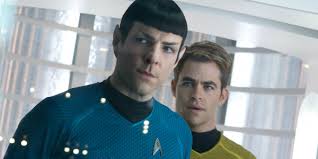Science-fiction can be a difficult genre of film for non-geeky, Average Joes and Janes to get their heads around. Often, the creation of new worlds and inventive forms of technology can simply become confusing if one isn’t already predisposed to being a technical genius, but there are some forms of science fiction that become so popular they transcend their genre and enter the general public consciousness.
The “Star Wars” and “Star Trek” juggernauts are perhaps the two best designed to make anyone in the universe fall prey to their charms. Packed with wit and humanity beneath all the jargon and effects, and often loaded with action that parallels the fun found in Westerns, cop movies and adventure films, these two franchises have lasted nearly 40 and 50 years, respectively, and are more popular than ever.
One man has been the mastermind behind both film series exploding into the 21st Century without losing a step: J.J. Abrams. The mastermind behind groundbreaking TV series “Alias” and “Lost,” as well as the last three “Mission:Impossible” films, Abrams has taken over being our funnest filmmaker from Steven Spielberg – and his only possible misstep so far was the prior “Star Trek” 2013’s “Star Trek: Into Darkness.”
Following a wildly inventive reboot of the entire “Trek” mythos with 2009’s “Star Trek” showing the key characters’ origin stories (dating back even before the William Shatner TV series), “Darkness” was a creative disappointment because it largely mimicked 1982’s smash hit “Star Trek: The Wrath of Khan.” So Abrams decided to shake things up, switching over to directing last December’s new “Star Wars” movie and handing the reins over to Justin Lin, who had turned the “Fast and Furious” series into the best action films currently being made on the planet.
Lin drew concern from some Trekkies for seeming to pack too much action into the new “Star Trek: Beyond,” at the expense of the series’ penchant for deeper philosophical discussions. But with an ingenious plot structure in which the team of heroes is divided helplessly into a series of duos, Lin and his writers Simon Pegg (who also plays Scotty) and Doug Jung have managed to exceed expectations with a film that explores issues of war and peace, division and unity, in fresh and exciting ways.
“Beyond” opts for a fresh villain this time around, as a hideous, beastly alien named Krall (Idris Elba) unleashes thousands of small but deadly ships he likens to a swarm of bees upon our heroes’ iconic Starship Enterprise. Captain Kirk (Chris Pine) and the rest of the gang were lured into the dangerous confrontation with Krall by being asked to save another ship in a distant nebula, and the Enterprise is so devastated it crashes into an unknown planet.
The escape pods necessary to getting off the crashing starship wound up splitting up the overall group into a series of pairs, which means both that we have more emotions and laughs than in “Darkness,” especially when Spock and McCoy are forced to team up for survival. The resulting adventure gets more entertaining as it goes, constantly upping the stakes with a series of impressive action setpieces until a final showdown that’s wildly entertaining and manages to use the Beastie Boys’ classic rap-rock tune “Sabotage” as the ingenious soundtrack for an epic space battle.
“Star Trek: Beyond” is a real hoot, and richly entertaining for anyone over age 13 (it’s PG-13) and possibly even over 10. The action scenes are occasionally intense but never graphic or bloody, only one or two “S” words and zero “F” words are heard, and sex and nudity are not actively shown.
The main moral qualms for “Beyond” lie in a couple of quick scenes in which it’s implied that male and female crew members are having casual sex on the lengthy space missions, and in a very quick and surprisingly subtle moment that reveals that Sulu (John Cho) is homosexual and that he and his partner are fathers of a daughter.
While the idea of Sulu being gay drew a lot of media hype, Lin and the writers make it as casual as an afterthought. Sulu scoops up his young daughter upon his return to earth from an early mission, and Kirk smiles from afar as he watches Sulu’s husband put his arm around his back as they walk away with their child.
This is unmistakably an attempt to make homosexual marriage a sympathetic idea, but it is played so subtly that it’s unlikely to truly offend adult and teen viewers and may be even not noticed at all by those under 8 or 10 years old. The film’s message of unity and forgiveness (amongst Enterprise members, not of Krall) makes this an overall positive experience in a summer packed with disappointments. Tie it all in with heavy doses of action and derring-do, and you absolutely have a Dateworthy movie here.



